Dish soap and vinegar cleaner: it sounds like a recipe for a salad dressing gone wrong, right? But trust me, this dynamic duo is about to become your new best friend in the garden! For generations, resourceful gardeners have relied on simple, homemade solutions to tackle common plant problems, and this one is a true classic. Think of it as a time-tested secret passed down through generations of green thumbs.
Why should you ditch the harsh chemicals and embrace this DIY marvel? Well, for starters, it’s incredibly cost-effective. We all know how expensive those fancy gardening sprays can be! Plus, you probably already have dish soap and vinegar sitting in your kitchen right now. But more importantly, it’s a much gentler option for your plants and the environment. We want to nurture our gardens, not bombard them with potentially harmful substances.
This article is packed with easy-to-follow instructions and helpful tips on how to create and use your own dish soap and vinegar cleaner. I’ll show you how to whip up the perfect concoction to combat aphids, whiteflies, and other pesky garden invaders. Get ready to unlock the power of this simple yet effective solution and watch your garden thrive!
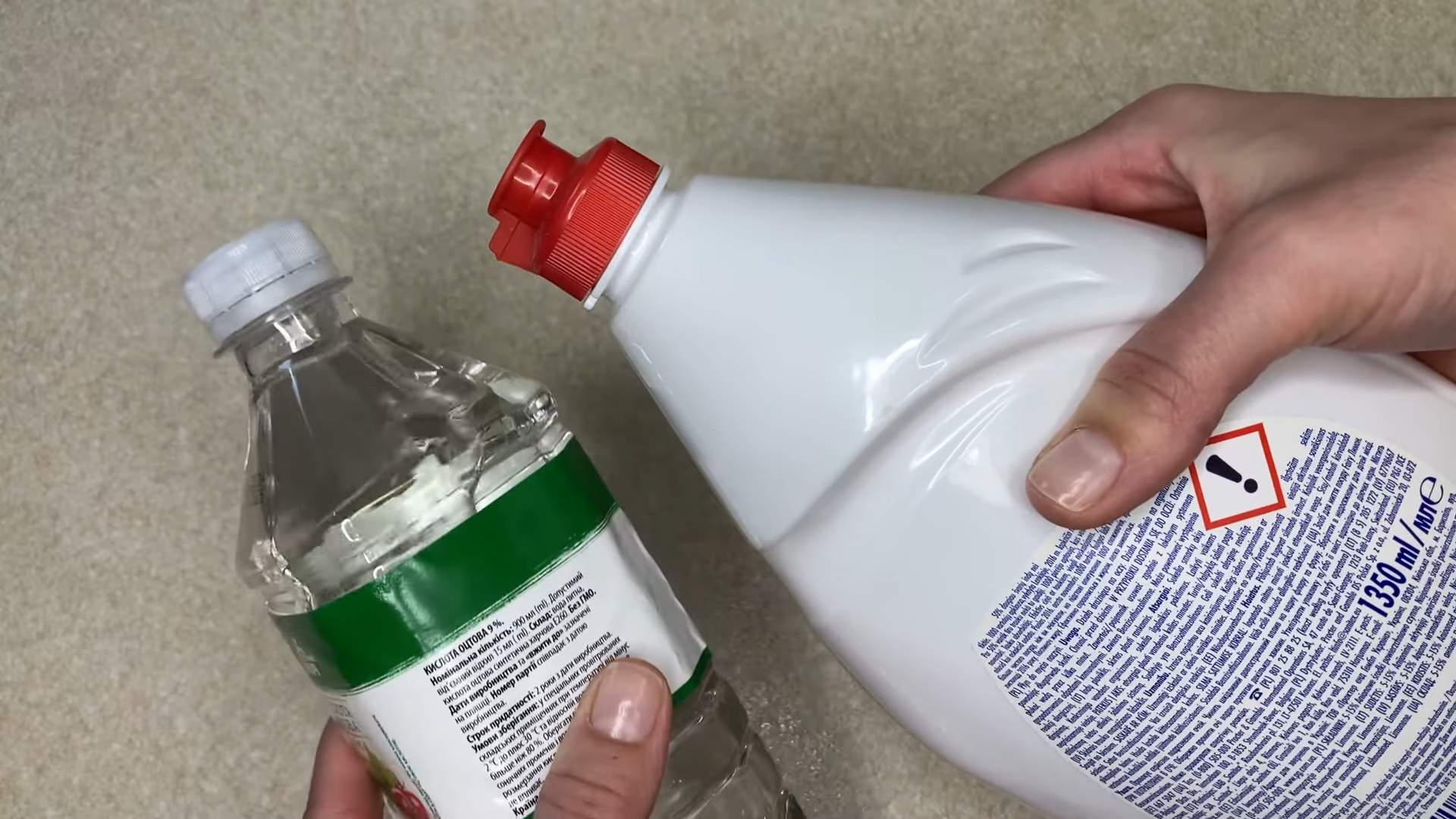
DIY All-Purpose Dish Soap and Vinegar Cleaner: A Sparkling Home Awaits!
Hey everyone! I’m so excited to share one of my favorite DIY cleaning hacks with you – a super effective, all-purpose cleaner made with just two ingredients: dish soap and vinegar! Seriously, it’s a game-changer. Not only is it incredibly easy to make, but it’s also budget-friendly and uses ingredients you probably already have in your kitchen. Plus, it’s a much more natural alternative to many harsh chemical cleaners on the market. Let’s get started!
Why This Cleaner Works (and Why You’ll Love It!)
Before we dive into the how-to, let’s quickly chat about why this simple combination is so powerful. Vinegar is a natural disinfectant and deodorizer. It’s acidic, which helps to cut through grease, grime, and hard water stains. Dish soap, on the other hand, is a surfactant, meaning it helps to lift dirt and grease away from surfaces. Together, they create a cleaning powerhouse!
Here’s a quick rundown of why I love this cleaner:
* Effective Cleaning: It tackles grease, grime, soap scum, and hard water stains like a champ.
* Budget-Friendly: Vinegar and dish soap are inexpensive and readily available.
* Natural Alternative: It’s a great way to reduce your exposure to harsh chemicals.
* Easy to Make: The recipe is super simple and takes just minutes to whip up.
* Versatile: You can use it on a variety of surfaces (more on that later!).
What You’ll Need
Gathering your supplies is the first step to any successful DIY project. Here’s what you’ll need to make your own dish soap and vinegar cleaner:
* White Vinegar: Plain white vinegar is the key ingredient. Don’t use apple cider vinegar, as it can leave a residue.
* Dish Soap: I recommend using a clear dish soap, as colored soaps can sometimes stain surfaces. Dawn is a popular choice, but any clear dish soap will work.
* Spray Bottle: You’ll need a clean, empty spray bottle to store and use your cleaner.
* Measuring Cup or Spoons: For accurate measurements.
* Funnel (Optional): This can help prevent spills when pouring the mixture into the spray bottle.
Making Your Dish Soap and Vinegar Cleaner: Step-by-Step
Okay, let’s get down to business! Here’s how to make your own all-purpose cleaner:
1. Gather Your Ingredients and Supplies: Make sure you have everything listed above within easy reach. This will make the process smoother and more efficient.
2. Measure the Vinegar: Pour 1 cup of white vinegar into your measuring cup.
3. Measure the Dish Soap: Add 1 cup of clear dish soap to the vinegar.
Important Note: You might notice a slight reaction when you mix the vinegar and dish soap. Don’t worry, this is normal! It’s just the acid in the vinegar reacting with the surfactants in the soap.
4. Gently Mix the Ingredients: Slowly and gently stir the vinegar and dish soap together. Avoid shaking vigorously, as this can create excessive bubbles. You want to combine the ingredients without creating too much foam.
5. Pour into Spray Bottle: Carefully pour the mixture into your clean spray bottle. If you’re using a funnel, this is where it comes in handy!
6. Label Your Bottle: It’s always a good idea to label your spray bottle so you know what’s inside. You can simply write “Dish Soap & Vinegar Cleaner” on a piece of tape and stick it to the bottle.
7. You’re Ready to Clean! That’s it! Your DIY all-purpose cleaner is ready to use.
Using Your Dish Soap and Vinegar Cleaner: Tips and Tricks
Now that you have your cleaner, let’s talk about how to use it effectively.
1. Test in an Inconspicuous Area: Before using the cleaner on a large surface, always test it in a small, hidden area first. This will help you ensure that it doesn’t damage or discolor the surface.
2. Spray and Wipe: Simply spray the cleaner onto the surface you want to clean and let it sit for a few minutes. Then, wipe it clean with a damp cloth or sponge. For stubborn stains, you may need to scrub a little harder.
3. Rinse if Necessary: On some surfaces, you may want to rinse with clean water after wiping. This is especially important on surfaces that come into contact with food.
4. Air Dry or Wipe Dry: Allow the surface to air dry or wipe it dry with a clean towel.
Where to Use Your Dish Soap and Vinegar Cleaner
This cleaner is incredibly versatile and can be used on a variety of surfaces around your home. Here are some of my favorite uses:
* Kitchen Counters: It’s great for cleaning up spills and messes on kitchen counters.
* Sinks: It effectively removes soap scum and hard water stains from sinks.
* Showers and Tubs: It’s perfect for cleaning shower walls, tubs, and shower doors.
* Toilets: It can be used to clean the outside of toilets.
* Floors (Certain Types): It can be used on tile and linoleum floors. Always test in an inconspicuous area first!
* Appliances: It’s great for cleaning the exterior of appliances like refrigerators, ovens, and dishwashers.
* Windows and Mirrors: It can even be used to clean windows and mirrors, leaving them streak-free.
Surfaces to Avoid
While this cleaner is generally safe for most surfaces, there are a few you should avoid:
* Marble and Granite: The acidity of vinegar can damage these natural stone surfaces.
* Waxed Wood: Vinegar can strip the wax from waxed wood surfaces.
* Aluminum: Vinegar can react with aluminum and cause it to corrode.
* Electronics: Never spray cleaner directly onto electronics.
Addressing the Vinegar Smell
One of the most common concerns people have about using vinegar as a cleaner is the smell. While the vinegar smell can be strong at first, it usually dissipates quickly. Here are a few tips to minimize the vinegar smell:
* Ventilate the Area: Open windows and doors to ventilate the area while you’re cleaning.
* Add Essential Oils (Optional): You can add a few drops of your favorite essential oil to the cleaner to mask the vinegar smell. Lavender, lemon, and tea tree oil are all good choices.
* Rinse with Water: Rinsing the surface with clean water after cleaning can help to remove any lingering vinegar smell.
Troubleshooting: Common Issues and Solutions
Even with the simplest DIY projects, you might encounter a few hiccups along the way. Here are some common issues and how to solve them:
* Streaky Surfaces: If you’re getting streaks, try using a clean, dry microfiber cloth to wipe the surface. You may also be using too much cleaner.
* Cloudy Cleaner: If your cleaner looks cloudy, it could be due to the type of dish soap you’re using. Try switching to a different brand of clear dish soap.
* Strong Vinegar Smell: As mentioned earlier, ventilate the area and consider adding essential oils.
* Cleaner Not Effective: If the cleaner isn’t working as well as you’d like, try increasing the amount of vinegar in the mixture.
Storing Your Dish Soap and Vinegar Cleaner
Store your cleaner in a cool, dark place away from direct sunlight. It should last for several months. If you notice any changes in the color or consistency of the cleaner, it’s best to discard it and make a fresh batch.
Safety Precautions
While this cleaner is relatively safe, it’s still important to take a few precautions:
* Keep Out of Reach of Children and Pets: Store the cleaner in a safe place where children and pets cannot access it.
* Avoid Contact with Eyes: If the cleaner gets in your eyes, rinse immediately with plenty of water.
* Do Not Mix with Bleach: Never mix vinegar with bleach, as this can create toxic fumes.
Final Thoughts
I hope you found this DIY guide helpful! This dish soap and vinegar cleaner is a simple, effective, and affordable way to keep your home sparkling clean. Give it a try and let me know what you think! Happy cleaning!
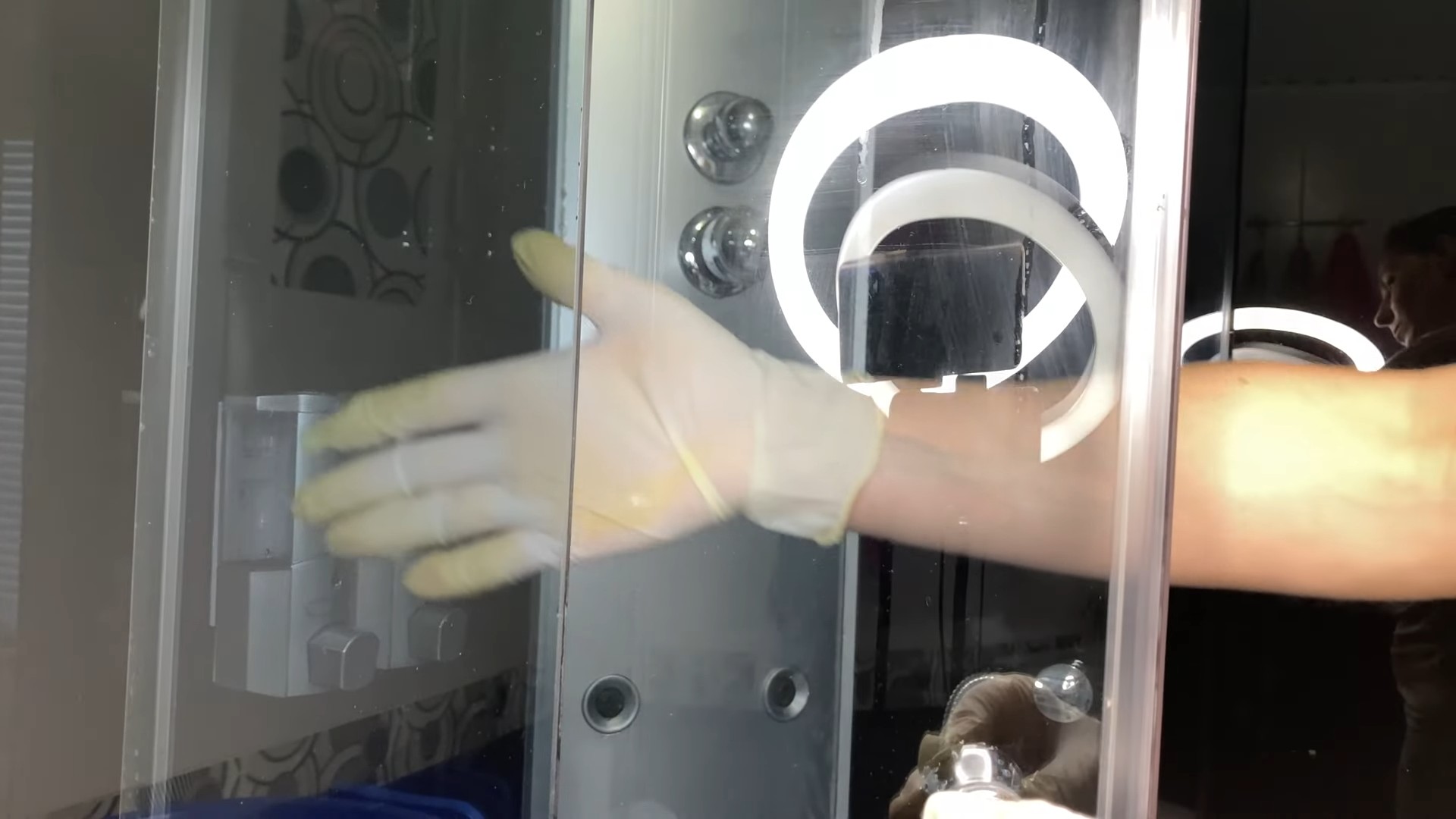
Conclusion
So, there you have it! A simple, effective, and incredibly affordable way to tackle grime and grease using just two common household ingredients: dish soap and vinegar. This DIY dish soap and vinegar cleaner isn’t just about saving money; it’s about creating a cleaning solution that’s gentle on your surfaces, tough on dirt, and free from harsh chemicals that can irritate your skin or harm the environment.
Why is this DIY trick a must-try? Because it works! The combination of dish soap and vinegar creates a powerful cleaning synergy. The dish soap cuts through grease and grime, while the vinegar disinfects and deodorizes. It’s a one-two punch that leaves your surfaces sparkling clean and smelling fresh.
But the beauty of this DIY cleaner lies in its versatility. Feel free to experiment with different variations to suit your specific needs and preferences. For a boost of freshness, add a few drops of your favorite essential oil, such as lemon, lavender, or tea tree. Lemon essential oil is particularly effective for cutting through grease and leaving a bright, citrusy scent. Lavender adds a calming aroma, while tea tree oil provides extra antibacterial properties.
For tougher stains or stubborn grime, consider increasing the concentration of vinegar in your solution. However, always test the cleaner on an inconspicuous area first to ensure it doesn’t damage the surface. Remember, vinegar is acidic and can etch certain materials, such as marble or granite.
Another variation you might want to try is adding a small amount of baking soda to the mixture. Baking soda acts as a mild abrasive, helping to scrub away stubborn dirt and grime. However, be cautious when using baking soda on delicate surfaces, as it can scratch them.
Beyond the basic recipe, consider using this DIY cleaner for a variety of cleaning tasks around your home. It’s perfect for cleaning kitchen counters, stovetops, sinks, bathroom tiles, shower doors, and even floors (just be sure to dilute it properly for floors to avoid leaving a residue). You can also use it to clean appliances, such as microwaves and refrigerators.
We are confident that once you try this DIY dish soap and vinegar cleaner, you’ll be amazed by its effectiveness and simplicity. It’s a game-changer for anyone looking for a natural, affordable, and effective cleaning solution.
So, what are you waiting for? Gather your dish soap and vinegar, mix up a batch of this amazing cleaner, and experience the difference for yourself. We encourage you to try this DIY dish soap and vinegar cleaner and share your experience with us! Let us know what variations you tried, what surfaces you cleaned, and what results you achieved. Your feedback will help other readers discover the power of this simple yet effective cleaning solution. Share your tips, tricks, and photos in the comments section below. We can’t wait to hear from you!
Frequently Asked Questions (FAQ)
Is dish soap and vinegar cleaner safe to use on all surfaces?
While dish soap and vinegar cleaner is generally safe for most surfaces, it’s essential to exercise caution and test it on an inconspicuous area first. Vinegar is acidic and can potentially damage or etch certain materials, such as marble, granite, natural stone, waxed wood, and aluminum. Always dilute the cleaner properly and avoid prolonged contact with sensitive surfaces. For delicate surfaces, consider using a milder solution with a higher concentration of dish soap and a lower concentration of vinegar.
What type of dish soap and vinegar should I use?
For dish soap, any standard liquid dish soap will work. Choose a dish soap that is effective at cutting through grease and grime. As for vinegar, white distilled vinegar is the best option for cleaning purposes. It’s inexpensive, readily available, and has a high acidity level, making it effective at disinfecting and deodorizing. Avoid using flavored vinegars, such as apple cider vinegar or balsamic vinegar, as they may leave a residue or stain.
Can I add essential oils to the dish soap and vinegar cleaner?
Yes, adding essential oils to your dish soap and vinegar cleaner is a great way to enhance its cleaning power and add a pleasant scent. Some popular essential oils for cleaning include lemon, lavender, tea tree, eucalyptus, and peppermint. Lemon essential oil is particularly effective for cutting through grease, while lavender adds a calming aroma. Tea tree oil has antibacterial properties, and eucalyptus and peppermint can help to freshen and deodorize. Add a few drops of your favorite essential oil to the mixture and shake well before using.
How long does dish soap and vinegar cleaner last?
Dish soap and vinegar cleaner does not have an indefinite shelf life, but it can last for several months if stored properly. To maximize its shelf life, store the cleaner in a sealed container in a cool, dark place. Avoid exposing it to direct sunlight or extreme temperatures, as this can cause the ingredients to degrade over time. If you notice any changes in the color, odor, or consistency of the cleaner, it’s best to discard it and make a fresh batch.
Can I use dish soap and vinegar cleaner to clean my toilet?
Yes, dish soap and vinegar cleaner can be used to clean your toilet. The vinegar will help to disinfect and deodorize the toilet bowl, while the dish soap will help to remove stains and grime. Simply pour the cleaner into the toilet bowl, let it sit for a few minutes, and then scrub with a toilet brush. Flush the toilet to rinse. For tougher stains, you can add a small amount of baking soda to the mixture.
Is it safe to mix dish soap and vinegar? I’ve heard mixing cleaning products can be dangerous.
While some cleaning product combinations are dangerous, dish soap and vinegar are generally safe to mix. The concern with mixing cleaning products usually arises with bleach, which can create toxic fumes when mixed with ammonia or acids like vinegar. Dish soap and vinegar, however, do not pose this risk. However, it’s always a good idea to use caution and avoid mixing any cleaning products unless you are certain they are safe to combine.
Can I use this cleaner in a spray bottle?
Absolutely! In fact, using a spray bottle is the most convenient way to apply this DIY cleaner. Just make sure the spray bottle is clean and free of any residue from previous cleaning products. A spray bottle allows you to easily target specific areas and control the amount of cleaner you use.
What if the vinegar smell is too strong?
The vinegar smell will dissipate as the surface dries. However, if you find the smell too strong, you can reduce the amount of vinegar in the solution or add more essential oils to mask the odor. You can also open windows or turn on a fan to improve ventilation while cleaning.
Can I use this cleaner on wood floors?
Use extreme caution when using this cleaner on wood floors. Vinegar can damage the finish on wood floors, especially if they are waxed or oiled. If you choose to use it, dilute the cleaner significantly with water and test it on an inconspicuous area first. Avoid leaving the cleaner on the floor for an extended period and dry the surface thoroughly after cleaning. A better option for wood floors is to use a cleaner specifically designed for wood.
How does this cleaner compare to commercial cleaning products?
This DIY cleaner offers several advantages over commercial cleaning products. It’s more affordable, environmentally friendly, and free from harsh chemicals that can be harmful to your health. While some commercial cleaners may be more powerful for specific cleaning tasks, this DIY cleaner is a great all-purpose solution for everyday cleaning needs. It’s also a good option for people with sensitivities to chemicals or allergies.
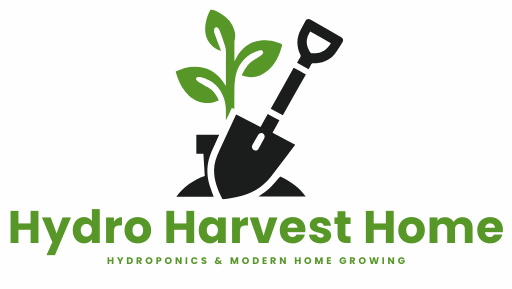
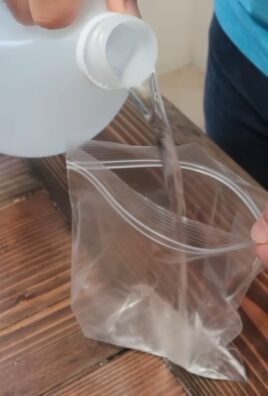
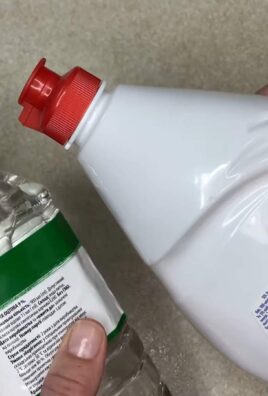
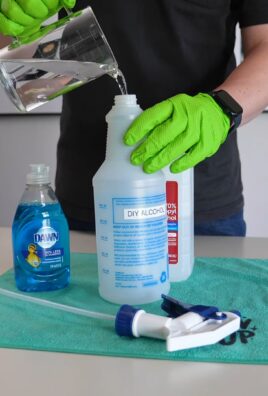
Leave a Comment